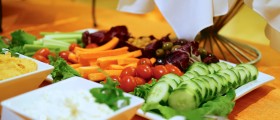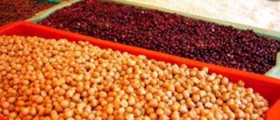
Given that breastfeeding requires extra calorie consumption, quality diet is equally important for both mother and her child. Some foods need to be completely removed or limited because it can negatively affect the quality of breast milk. Also, the mother must eat enough quality food because breastfeeding consumes much more energy than usual. Poor diet won’t have bad affect on baby’s health, but can cause problems for the mother.
High-quality diet of mothers that breast feeding means respecting some rules. In the first place it is increased fluid intake, because it is going directly to production of milk. But, this shouldn’t be exaggerated, because it can lead to reduced milk production. Then, the intake of calories should be increased up to 2500 per day, but this assumes avoiding sweets and increasing intake of proteins. Daily diet should be divided in 5 meals that consist of a rich intake of fruits, water and dairy products with a low percentage of milk fat. Meals should be taken regularly.
It is important to limit the use of nicotine and alcohol. They pass directly through milk and may harm the baby. Also, before using any drug, consult a doctor because some medications (for example, drugs that contain iodine) can have negative effects on the quality of milk and therefore the baby. In addition, should stay out of vicinity of pesticides and insecticides that can be incorporated in the production of milk by breathing them in.
It is necessary to increase the use of unsaturated fats contained in olive oil, rapeseed oil, sunflower and corn that have positive influence on the development of the baby’s nervous system.
In the period of breastfeeding it is necessary to increase the intake of vitamin B 9, which is known under the name of folic acid. It is taken regularly during pregnancy because it provides proper development of the baby’s nervous system, but its use should continue in the period after delivery to ensure quality breast milk. Using the contraceptive pill can lead to significant shortages of vitamins B 6 and B 9 in the body. Foods enriched with folic acid are spinach, cabbage, peas, asparagus, corn, wheat, juice, etc.
During breastfeeding it is often required to take supplements of zinc and calcium. Foods rich in calcium are raw vegetables, almonds, hazelnuts and milk products while zinc is contained in meat, eggs, oats and white flour. However, the use of vitamin supplements should not be rushed. Even though the daily need for vitamins increases during pregnancy and lactation period, increased intake of vegetables, butter, fish and meat can fully compensate the lack of vitamins.
In addition to the advantages of the quality of milk achieved by eating certain types of food, there are some foods that can worsen the taste of breast milk. It is believed that cabbage, spices, onions, cauliflower, turnip, celery, watercress and leeks can cause stomach cramps in babies. If you receive negative reactions from your baby, you should think about the food you ate during the day, and if the pattern repeats, the food which is suspicious should be expelled from use.
















Your thoughts on this
Loading...